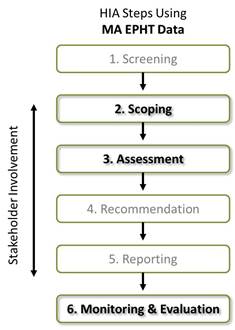Health Impact Assessment
Introduction to Health Impact Assessments

Health Impact Assessment (HIA) is a tool to identify potential health impacts and benefits of a proposed project, program, or policy decision and recommend strategies that best protect and promote health.
The guiding principles of an HIA are:
- involvement and engagement of stakeholders to inform a decision
- consideration of the vulnerable groups
- evaluation of both short- and long-term impacts and benefits, and
- assessment of health using evidence-based methods that consider physical, mental, environmental, economic, and social determinants of health.
An HIA can be applied to evaluate a proposed project, program or policy across many different sectors. The goal of HIAs is to bring a wide range of public health concerns into the decision-making process to reduce impacts and promote healthy communities. HIAs can be useful in assessing health risks and benefits of decisions where health is not typically considered, including those involving transportation and land use planning projects.
Using Tracking Data for Health Impact Assessments
Health and environmental datasets provided on the MA EPHT portal can help inform HIAs. The portal is uniquely positioned to inform HIA practice by:
- Improving access to baseline health and environmental data
- Providing content developed by specialists in data analyses, GIS, data visualization, epidemiology, toxicology, and risk communication
- Serving as a tool supporting the development of collaborative partnerships and cross-program activities or initiatives
Tracking data are collected and updated on an ongoing basis. This aspect makes Tracking data especially useful for monitoring and evaluating actions and decisions over time. For example, data can be used to evaluate pre- and post-implementation impacts of the HIA decision or action.
Steps of an HIA
The HIA process consists of six steps:
- Screening – identify plans, projects or policies for which an HIA would be useful
- Scoping – explore the relevant health outcomes and environmental issues of interest
- Assessment – identify the population that would be affected, describe the baseline health of the population, and determine the potential impacts
- Recommendations – suggest solutions or changes to the plan, project or policies to best improve health outcomes
- Reporting – present and distribute results
- Monitoring and Evaluation – determine the effect of the HIA on the plan, project or policy

Data from the Tracking website can be used to inform the Scoping, Assessment and Monitoring and Evaluation steps of an HIA.
Stakeholder involvement is an integral component of HIA and each step of the HIA process provides opportunity for meaningful engagement. Stakeholders include those with an interest in the outcome of the decision the HIA is informing, such as policy-makers or transportation officials, and the people who will be most directly impacted by the decision.
The stakeholder involvement process includes formal and informal meetings with stakeholders to share information and seek input on the proposal. This process may involve formal community meetings as well as outreach to interested groups not able to participate in formal stakeholder meetings. The process includes distributing draft presentations, draft reports, and related information in publicly accessible forums such as websites and local libraries.
Additional information about the minimum elements and practice standards for HIA can be found in this pdf.
HIA in Massachusetts

In June 2009, Governor Deval Patrick signed the landmark Transportation Reform Law (M.G.L. Chapter 6C). Section 33 mandates the creation of the Healthy Transportation Compact (HTC). The HTC is co-chaired by the Secretaries of Transportation and Health and Human Services, and includes the Secretary of Energy and Environmental Affairs, MassDOT Highway Administrator, MassDOT Transit Administrator, and the Commissioner of Public Health. The HTC is charged with increasing access to healthy transportation alternatives that reduce greenhouse gas emissions; improving access for persons with mobility limitations; increasing opportunities for physical activity; and promoting active transportation.
The HTC is also charged with:
- Establishing methods to implement the use of HIA to determine the effect of transportation projects on public health and vulnerable populations; and
- Instituting HIA for use by planners, transportation administrators, public health administrators and developers.
As part of this mandate, the Massachusetts Department of Public Health (MDPH) and the Massachusetts Department of Transportation (MassDOT) are collaborating to develop methods for conducting HIAs for transportation planning. This effort builds on a pilot HIA conducted in tandem with a MassDOT transportation planning study of the McGrath Highway in Somerville, MA. This represents the first intitiative towards achieving the HTC goals of developing methods and instituting HIAs in transportation planning in Massachusetts. Additional information about the Health Impact Assessment of the Massachusetts Department of Transportation Grounding McGrath Study is provided below.
HIA Practice at DPH
In addition to the Grounding McGrath HIA, Massachusetts received funding from the Centers for Disease Control and Prevention's (CDC) Healthy Community Design Initiative. This initiative focused on identifying opportunities at the state, regional and local level to educate stakeholders on the link between community design and health by supporting HIA projects associated with the built environment and land use issues.
The practice of HIAs often relies on previously conducted HIAs to inform future approaches, methods, and tools.
A few examples of HIAs in Massachusetts include:
Assessing the Health Impacts and Benefits of Regional Climate Action Plan Strategies in Western Massachusetts:
DPH’s Bureau of Climate and Environmental Health and Bureau of Community Health and Prevention partnered with the Pioneer Valley Planning Commission and the municipalities of Springfield and Williamsburg to conduct a health impact assessment (HIA) to evaluate climate action strategies recommended in the regional Pioneer Valley Climate Action and Clean Energy Plan completed by the PVPC in 2013. The aim of that plan was to promote greater understanding of the causes and consequences of climate change in PVPC’s service region (which includes Springfield and Williamsburg) and to identify a set of actions that local governments and other partners could consider to mitigate and adapt to climate effects. The HIA focused on two strategies: reducing the burden of heat-related events and assessing co-benefits of installing energy efficiency measures in municipal buildings. The methods allowed the communities to integrate baseline health and environmental data including local climate projections, identify climate-related vulnerabilities, promote wellness ad health equity, and prioritize evidenced-based climate action strategies at the community level.
Health Impact Assessment of the Massachusetts Department of Transportation Grounding McGrath Study:
This Grounding McGrath HIA is the first HIA mandated under the 2009 Transportation Reform Law in Massachusetts. The HIA focused on a transportation planning study to de-elevate portions of the McGrath Highway in a densely populated Environmental Justice community in Somerville, Massachusetts. It was conducted in tandem with the MassDOT study to provide supplemental health data to support optimal transportation design alternatives. The HIA was funded by the Health Impact Project, a collaboration of the Robert Wood Johnson Foundation and The Pew Charitable Trusts (www.healthimpactproject.org). The recommendations in the HIA included the need to reduce near-roadway exposure to motor vehicle emissions, ensure affordability of goods and services, stabilize the cost of rental apartments, and increase availability of employment opportunities.
